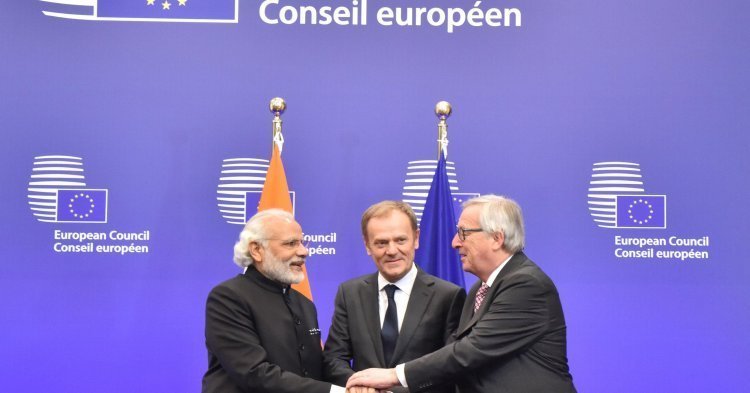In New Delhi, the President of the European Commission renewed his unaltered will to reinforce the European Union’s position in world trade, with the support of obvious partnerships: “Our countries are the two largest democracies in the world. We are two of the world’s biggest economies. We share the same values and we believe in freedom, equality, tolerance and the rule of law. A partnership with India simply makes sense. It’s natural.” [1]
Restarting the negotiations for a free trade agreement
The European Union and India had initiated negotiations towards a free trade agreement in 2007, but after about fifteen rounds of talks, many topics are still unresolved. The two parties especially have to reach an agreement on the improvement of the access to markets for certain goods and services, and on geographical indications. The main objective of this 14th EU-India summit was to restart the negotiations after the President of the European Commission’s announcements during his State of Union address, where he proved to be very favourable to an agreement on free trade. The EU and India together praised the launch of the Investment Facilitation Mechanism (IFM) last July. The IFM should allow further EU investments in India, while supporting European companies who wish to get involved in the country.
In the end, very few concrete measures were announced during this summit, but both Presidents of the Commission and of the Council demonstrated their will to reinforce the European Union’s position in world trade and to restart negotiations with India, although no official date has been set for the beginning of new negotiations.
Across the Channel, British media quickly considered this Indian-European summit as the beginning of a trade war between the European Union and the United Kingdom. Theresa May has already affirmed her will to pursue trade agreements with India after Brexit. India is a strategic partner which could soon assert itself as one of the world leading economic powers.
Committed to responsible development
European and Indian leaders adopted a joint statement on climate change and clean energy in which they commit to “take the lead in global efforts” in regard to fighting against global warming. India and the European Union thus wish to promote exchanges between local and regional authorities within their territories on the topic of smart growth, associating the European Union’s urbanization programme and India’s Smart Cities Mission. Furthermore, the European Investment Bank (EIB) announced its commitment to developing sustainable transport in India and approved a sizeable loan of 500 million.
This strategic partnership for responsible development also focused on water research with the announcement of a 30 million euros initiative. A forum will take place on the 11th of October so as to discuss concrete steps to take as well as to announce a research agenda.
Acting together on the international stage
Two days before the Indian-European Summit, a joint naval exercise was realised between an Italian ship, chair of the Operation Atalanta of the EU naval force, and an Indian Navy ship, off the coast of Somalia. Other joint exercises should follow as the European Union and India wish to pursue their cooperation for maritime security. The programme also includes the fight against terrorism, radicalization and violent extremism. Few concrete joint measures were taken but a resolution for the two parties to consult each other regularly. For instance, cooperating on the matter of cybersecurity will be on the agenda for the next world conference on cyberspace, which will take place in November in New Delhi.



Follow the comments: |
|
